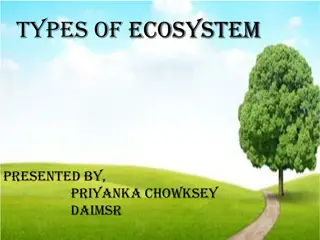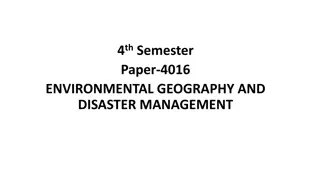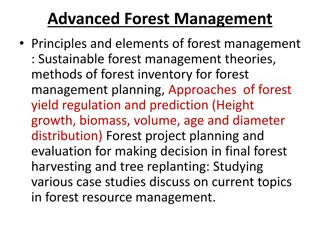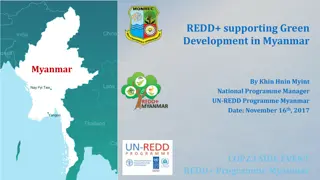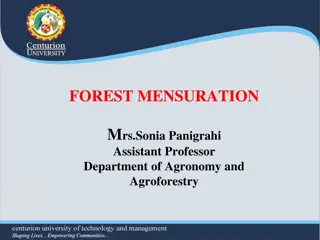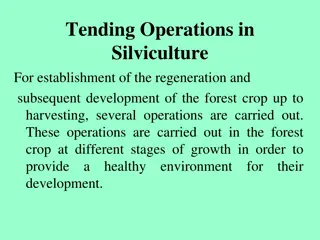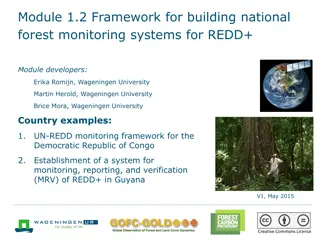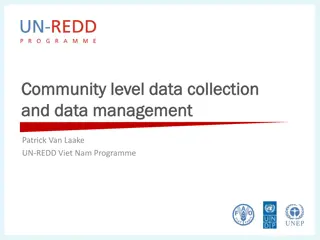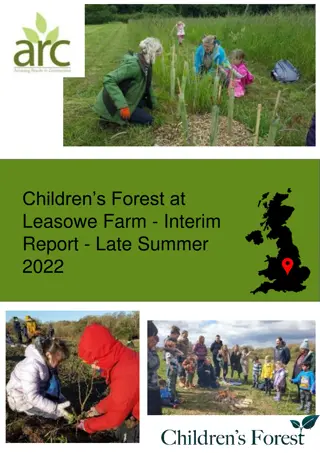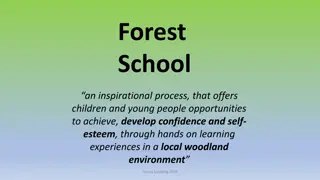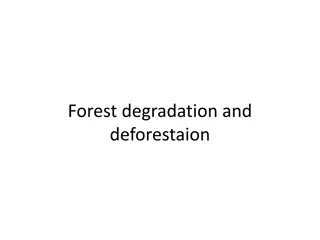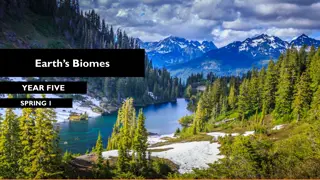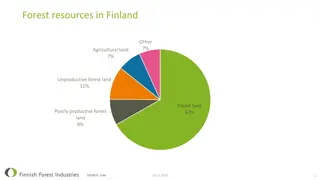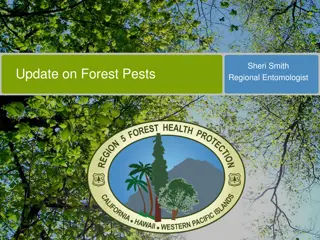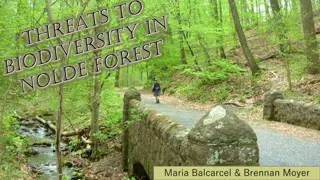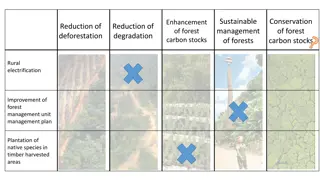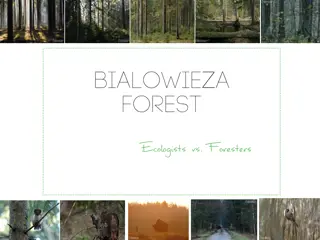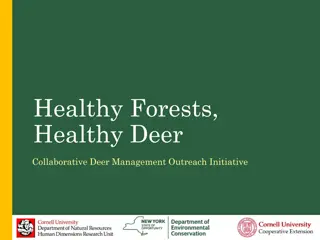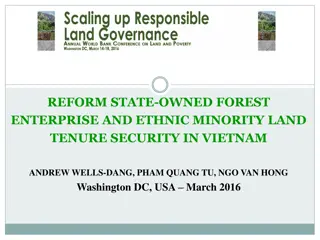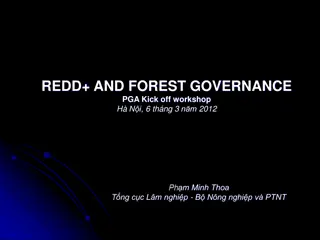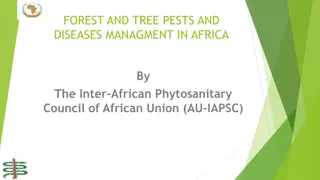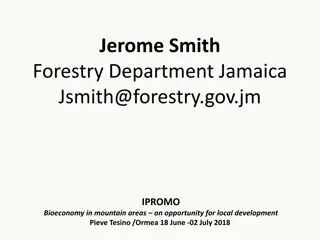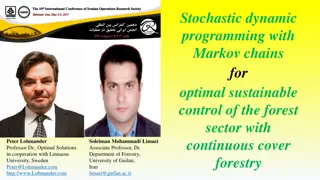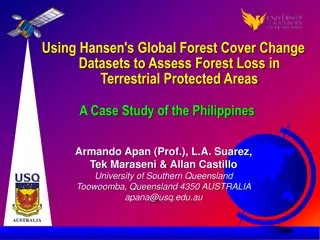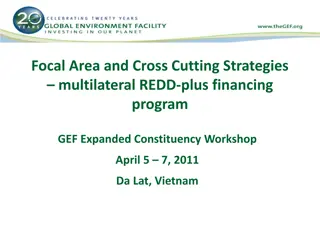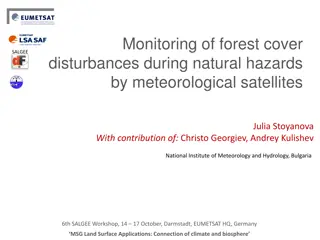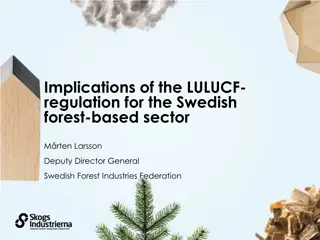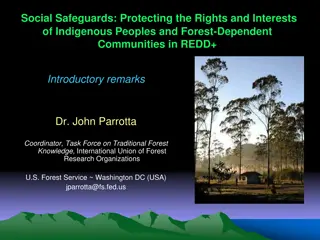Hawai'i Forest Industry Association (HFIA)
HFIA is a statewide, nonprofit trade association established in 1989. Our mission is to promote healthy and productive forests and a sustainable forest industry through forest management, education, planning, information exchange, and advocacy.
1 views • 8 slides
Exploring Different Ecosystem Types and Functions
Learn about the major types of ecosystems such as Grassland, Aquatic, Forest, and Desert presented by Priyanka Chowksey of DAIMSR. Understand the components of an ecosystem, including biotic and abiotic factors, and the significance of different ecosystems like Forest Ecosystem and Desert Ecosystem.
4 views • 29 slides
Tamil Nadu Forest Uniformed Service Recruitment Committee (TNFUSRC)
Tamil Nadu Forest Uniformed Service Recruitment Committee (TNFUSRC)\nThe Tamil Nadu Forest Uniformed Services Recruitment Committee (TNFUSRC) is an organization responsible for recruiting candidates for various uniformed services positions within the Tamil Nadu Forest Department.\nSelection process
0 views • 5 slides
California Forest Improvement Program (CFIP) Overview
The California Forest Improvement Program (CFIP) aims to promote investments in forestlands to ensure timber supplies, employment, and economic benefits while enhancing the forest resource. Funding sources, program objectives, eligibility requirements, and reimbursement details are covered in the pr
1 views • 22 slides
Prestige Forest Hills | Best Residential Homes In Mumbai
Prestige Forest Hills is a luxury residential property located in Bangalore. It offers 2\/3\/4 BHK apartments, every house exudes beauty and comfort. Residents can enjoy many luxury facilities consisting of landscaped gardens, a clubhouse, a swimming pool, and leisure centres. It ensures access to t
6 views • 11 slides
Understanding Forest Fires and Their Causes in India
Forest fires have become increasingly common in India, with recent incidents in various states causing significant damage to biodiversity and ecology. Factors such as smoking, campfires, fireworks, burning debris, and natural causes like lightning contribute to the occurrence of these devastating fi
0 views • 13 slides
Principles of Advanced Forest Management
Explore sustainable forest management theories, inventory methods, yield regulation approaches, and project planning for effective decision-making in forest resource management. Delve into the principles of forest management, land classification, growth projection, yield prediction, and sustainable
0 views • 26 slides
Promoting Green Development Through REDD+ in Myanmar
Myanmar, with its vast forest resources, faces challenges of high deforestation rates and forest degradation. The REDD+ Programme in Myanmar aims to tackle these issues through a comprehensive strategy involving multiple stakeholders. The program focuses on sustainable forest management, community e
1 views • 9 slides
Understanding Forest Mensuration Techniques and Measurements
Exploring the importance of diameter and girth measurements at breast height in forest mensuration, highlighting the standard rules and conventions followed globally. Learn about DBH, GBH, basal area, and the significance of consistent measurement practices for accurate estimations. See visuals and
1 views • 41 slides
Forest Service Multimedia Resources Overview
Explore the diverse multimedia resources offered by the Forest Service, including photography, video standards, Flickr archives, Instagram presence, and communication hub. From official videos to captivating images, discover how you can engage with the Forest Service through various platforms.
0 views • 8 slides
Tending Operations in Silviculture: A Comprehensive Guide
Tending operations in silviculture are crucial for the establishment and development of forest crops. These operations include weeding, cleaning, thinning, improvement felling, pruning, and climber cutting. Each operation serves a specific purpose in ensuring the healthy growth and development of th
0 views • 23 slides
Framework for Building National Forest Monitoring Systems for REDD+
This module outlines a comprehensive framework for developing national forest monitoring systems for REDD+ initiatives. It covers key components such as satellite land monitoring, national forest inventories, greenhouse gas reporting, emission factors, and integrated monitoring systems focusing on c
0 views • 14 slides
Community-Based Data Collection and Forest Management for REDD+ Initiatives
Participatory approaches in forest management by local communities have shown success in conservation efforts. Ownership, long-term commitment, and social pressures play key roles. Additionally, secondary uses of the forest, carbon assessment by communities, supplementary data collection, and effici
0 views • 12 slides
Children's Forest at Leasowe Farm - Interim Report Late Summer 2022
ARC CIC received funding to establish a Children's Forest at Leasowe Farm, aiming to connect children and the community with nature, educate on climate change mitigation, and plant 2600 trees by engaging with the community. The project involves a steering group with diverse representation, collabora
0 views • 17 slides
Exploring Forest School: A Journey of Learning and Development
Forest School is an inspirational process that fosters holistic development through hands-on experiences in woodland settings. Originating in the UK, it follows six principles of good practice, emphasizing regular sessions, learner-centered approaches, and qualified practitioners. Joining a Forest S
0 views • 5 slides
The Legend of Sherwood Forest: From Royal Hunting Reserve to Nature Reserve
Sherwood Forest, once a royal hunting reserve in the 10th Century, is renowned for its association with the legendary figure Robin Hood. The forest provided cover for both hunting and outlaws, eventually becoming a nature reserve attracting millions of visitors annually. Despite its reduced size fro
0 views • 9 slides
Application of CMS-Flux System for Carbon Flux Inventories Evaluation
Preparation for the global CMS Flux system integration with US forest and agricultural carbon inventory data to quantify uncertainties and enhance inventory-relevant flux estimates. The project aims to evaluate the utility of CMS-Flux-NA system for top-down assessment of US agricultural and forest C
2 views • 21 slides
Understanding Deforestation and Forest Degradation: Causes and Impacts
Deforestation and forest degradation are significant environmental issues driven primarily by agriculture, logging, and population growth. Other causes include corruption, inequitable distribution of wealth and power, and urbanization. Globalization and historical exploitation also play a role. Deve
0 views • 53 slides
Exploring Earth's Biomes in Year 5 Spring
Delve into the fascinating world of Earth's biomes through an engaging learning review in Year 5 Spring. Discover diverse ecosystems like tundra, desert, temperate broadleaf forest, tropical forest, grasslands (Savannah), and coniferous forest (Taiga). Enhance your knowledge of different climates, p
0 views • 11 slides
Global Spatial Distribution and Economic Significance of Forest Resources
Forest resources play a crucial role in the global economy, with uneven distribution across continents. The largest forest areas are found in countries like Russia, Brazil, and Canada. Tropical forests dominate in ecological type, followed by boreal, temperate, and subtropical regions. The economic
0 views • 47 slides
Overview of Forest Resources in Finland
Forest resources in Finland consist of various types of land, with forest land being the most dominant at 67%. Pine and spruce are the most common tree species, making up 80% of the total volume. Private forest owners own a significant portion of forest land at 60%. The growth of Finnish forests is
2 views • 6 slides
Forest Resources and Challenges in India: A Detailed Overview
India's forest resources face challenges due to degradation, impacting the economy and environment. The country produces a range of forest products, with forestry contributing to GDP. However, unsustainable practices such as excessive fuelwood consumption pose threats. Non-wood forest products are s
0 views • 48 slides
Update on Forest Pests Impacting Northern CA National Forests
Regional entomologist Sheri Smith provides insights on the devastating impact of forest pests on Northern CA National Forests, including tree mortality rates, drought conditions, bark beetle attacks, and the vulnerability of trees to various stress factors, with a highlight on the significant tree d
0 views • 29 slides
Conservation Efforts and Threats to Biodiversity at Nolde Forest
Nolde Forest State Park, established by hosiery baron Jacob Nolde in the early 1900s, is a lush coniferous forest now dedicated to environmental education. The park faces threats to biodiversity such as natural disasters, invasive species, and human activity. Hurricane Sandy's impact in 2012 and the
2 views • 13 slides
Sustainable Forest Management for Carbon Conservation and Biodiversity Enhancement
Sustainable forest management practices focused on conservation and enhancement of forest carbon stocks, reduction of deforestation and degradation, rural electrification, and improvement of forest management unit plans. Initiatives include assessment of forest resources, capacity building for field
1 views • 4 slides
Białowieża Forest: Europe's Last Primeval Forest
Białowieża Forest, the largest natural forest complex in the Central European Lowlands, is a treasure trove of diverse forest communities and abundant wildlife. Protected since ancient times, it faces threats like the European spruce bark beetle. Ecologists advocate for forest conservation to pres
0 views • 13 slides
Understanding Deer Impact on Forest Regeneration
Explore the collaborative deer management outreach initiative focused on maintaining healthy forests by addressing the impact of white-tailed deer on forest regeneration. Learn about the factors influencing forest health, predicted regeneration of tree species, and survey results on forest regenerat
0 views • 27 slides
Reforming State-Owned Forest Enterprises and Ensuring Ethnic Minority Land Tenure Security in Vietnam
Vietnamese government nationalized agricultural and forest land in the 1950s, impacting ethnic minority groups. Despite attempts to reform state-owned forest enterprises, conflicts over forest land persist. This study examines policies, processes, and conflicts in three provinces to offer recommenda
0 views • 20 slides
Understanding REDD+ and Forest Governance for Sustainable Resource Management
REDD+ stands for Reducing Emissions from Deforestation and forest Degradation, encompassing activities to enhance carbon stocks, conservation, and sustainable forest management. Forest governance plays a crucial role in reducing risks related to land use change, illegal logging, and forest degradati
0 views • 11 slides
Forest and Tree Pests and Diseases Management in Africa
The management of forest pests and diseases in Africa is crucial to safeguard the continent's forests, international trade, and forest products. This presentation provides insights into the occurrence, distribution, economic impacts, and regional cooperation for managing forest pests. Major pests an
0 views • 12 slides
Jerome Smith - Forest Department Director Promoting Bioeconomy in Mountain Areas
Jerome Smith is the Principal Director of Forest Operations in Jamaica, focusing on environmental policies and sustainable forest management. He has spearheaded various programs, including the EU-supported initiative to address climate change challenges through improved forest management in Jamaica.
0 views • 8 slides
Optimal Sustainable Control of Forest Sector with Stochastic Dynamic Programming and Markov Chains
Stochastic dynamic programming with Markov chains is used for optimal control of the forest sector, focusing on continuous cover forestry. This approach optimizes forest industry production, harvest levels, and logistic solutions based on market conditions. The method involves solving quadratic prog
0 views • 27 slides
Assessing Forest Loss in Protected Areas: A Philippines Case Study
The study assesses forest cover loss in terrestrial protected areas of the Philippines, analyzing the extent and rate of deforestation using Hansen's Global Forest Cover Change datasets. The research aims to understand the drivers of deforestation in protected areas, comparing forest loss in the ent
0 views • 24 slides
Exploring Perimeter, Area, and Mensuration in Mathematics
In this educational module, we delve into the concepts of perimeter and area of closed plane figures like triangles, rectangles, circles, and quadrilaterals. We also discuss surface area and solve problems related to these geometric concepts. Through examples and visuals, students learn how to calcu
0 views • 11 slides
Understanding Calcium Influence on Earthworm Behavior in Forest Ecosystems
Earthworm biomass dominance by Lumbricus terrestris in the Siemianice Experimental Forest is linked to their high calcium requirements, as indicated by their calciferous glands producing calcium carbonate to regulate blood pH in the face of high soil CO2 levels. The positive relationship between for
0 views • 8 slides
GEF Forest Investments and Sustainability Strategies
The Global Environment Facility (GEF) focuses on financing forest projects to address climate change, biodiversity conservation, and land degradation. With a history of investing in forests since 1991, GEF has created programs like GEF-5 SFM/REDD-plus to generate multiple environmental and social be
0 views • 11 slides
Monitoring Forest Cover Disturbances During Natural Hazards by Meteorological Satellites
Ecosystem functioning relies on energy, water, and carbon fluxes regulated by vegetation and soil properties. This study focuses on monitoring forest cover disturbances before, during, and after natural hazards using meteorological satellites. It involves analyzing land surface temperature, evapotra
0 views • 37 slides
Implications of LULUCF Regulation for Swedish Forest Sector
The Swedish Forest Industries Federation discusses the implications of LULUCF regulation on the forest-based sector in Sweden, aiming for a fossil-free welfare state by 2045. The sector plays a vital role in driving growth in the global bioeconomy, with sustainable forest management strategies highl
0 views • 14 slides
Empowering Communities Through Micro Planning for Forest Development
Micro Planning is a community-based process empowering forest-dependent communities to create a roadmap for sustainable development. Joint Forest Management Committees and other bodies organize the preparation of ten-year development plans prioritizing activities for enhanced livelihoods. The proces
0 views • 15 slides
Safeguarding Indigenous Peoples and Forest Communities in REDD+
Exploring traditional forest knowledge and its importance to culture, livelihoods, and conservation efforts. The IUFRO Task Force focuses on preserving traditional knowledge, addressing threats, and identifying opportunities for collaboration with modern forest science. Unique features include susta
0 views • 10 slides

